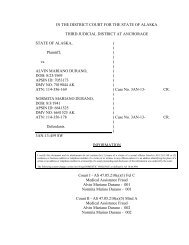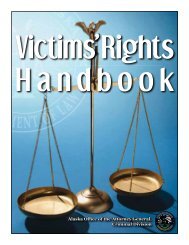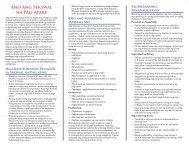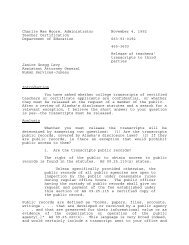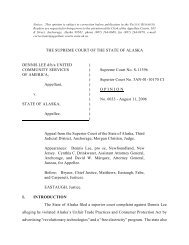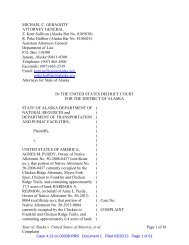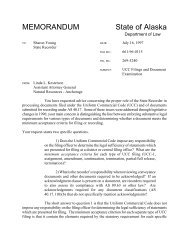Initial Report and Recommendations - Alaska Department of Law
Initial Report and Recommendations - Alaska Department of Law
Initial Report and Recommendations - Alaska Department of Law
- No tags were found...
You also want an ePaper? Increase the reach of your titles
YUMPU automatically turns print PDFs into web optimized ePapers that Google loves.
skills necessary to communicate within the cultures served. 122 It also recommends thattribal police receive forensic training to the same degree that <strong>Alaska</strong> State Troopers, other123, 124municipal police <strong>of</strong>ficers, <strong>and</strong> investigators do.In studying the problems <strong>of</strong> domestic violence, child abuse, <strong>and</strong> sexual assault inrural <strong>Alaska</strong>, the Commission has found that there is a lack <strong>of</strong> information <strong>and</strong> dataregarding law enforcement’s response to these criminal activities, <strong>and</strong> the data that doexist are neither consistent nor st<strong>and</strong>ardized. A new data base <strong>and</strong> reporting requirementsneed to be established to monitor investigations by law enforcement <strong>and</strong> to verify thatinvestigations are adequate <strong>and</strong> uniformly carried out. This should include both internal<strong>and</strong> external quality control audits to provide sufficient <strong>and</strong> consistent information toconfirm that cases <strong>of</strong> domestic violence, the abuse <strong>of</strong> minors, <strong>and</strong> sexual assault areadequately investigated by law enforcement. 1258. Increase Access to Judicial ServicesOverall, the Commission has found that residents <strong>of</strong> rural <strong>Alaska</strong> do not haveaccess to sufficient civil legal assistance to redress legal problems related to domesticviolence <strong>and</strong> child abuse, 126 <strong>and</strong> it recommends more funding to meet civil legal needsfrom local, state, federal, <strong>and</strong> private sources, including increased federal funding tosupport Violence Against Women Act Legal Assistance to Victims Grants. TheCommission notes that, since 1995, federal Legal Services Commission (LSC) grants tothe <strong>Alaska</strong> Legal Services Corporation (ALSC) have fallen from about $1.7 million toabout $1.2 million, <strong>and</strong> over the same interval state legislative appropriations for ALSChave fallen from about $300,000 to zero. Meanwhile, more people than ever before fellbelow the <strong>Alaska</strong> poverty ceiling: 80,405 as <strong>of</strong> the 2000 census, up from 66,558 as <strong>of</strong> the1990 census. ALSC estimates that, while it closed approximately 1,700 cases during2004, approximately 1,040 other callers were given only brief telephonic referrals due tolack <strong>of</strong> resources on ALSC’s part to provide assistance. To improve access to civil legalassistance, the Commission also recommends the increased use <strong>of</strong> tribal courts <strong>and</strong> theuse <strong>of</strong> existing video-conferencing capability to provide better legal representation to127, 128, 129residents in rural areas <strong>of</strong> <strong>Alaska</strong>.122 In its <strong>Report</strong> "Improving Safety in Indian Country: <strong>Recommendations</strong> from the IACP 2001 Summit" theInternational Association <strong>of</strong> Chiefs <strong>of</strong> Police recommended that the federal government should fundservices such as forensic exams. (IACP Recommendation #44 at p. 27 <strong>of</strong> that <strong>Report</strong>).123 In its Final <strong>Report</strong> to the Governor, 1999, the <strong>Alaska</strong> Commission on Rural Governance <strong>and</strong>Empowerment recommended that a local law enforcement <strong>of</strong>ficer should be present in everycommunity in <strong>Alaska</strong>, that such <strong>of</strong>ficers should be fully trained, staffed <strong>and</strong> paid, <strong>and</strong> that the Stateshould support federal efforts to train, equip <strong>and</strong> pay tribal <strong>of</strong>ficers.124 Recommendation 47.125 Recommendation 48.126 The <strong>Alaska</strong> Supreme Court Advisory Committee on Fairness <strong>and</strong> Access in its 1997 report found that“lack <strong>of</strong> local services can have serious ramifications: . . . civil matters like child support, adoption,probate, <strong>and</strong> small claims go unattended, telephonic hearings work poorly when the witness has limitedEnglish skills or poor underst<strong>and</strong>ing <strong>of</strong> the concepts involved, <strong>and</strong> villagers remain ignorant <strong>of</strong> the lawbecause they never see it in action.” Directory, fn. 47, p. 20, citing <strong>Alaska</strong> Court System, <strong>Report</strong> <strong>of</strong> the<strong>Alaska</strong> Supreme Court Advisory Committee on Fairness <strong>and</strong> Access 14, 105 (1997).127 In the report “Racism’s Frontier: The Untold Story <strong>of</strong> Discrimination <strong>and</strong> Division in <strong>Alaska</strong>, 2001,”the <strong>Alaska</strong> Advisory Committee to the U.S. Commission on Civil Rights recommended(Recommendation 3.6, at p.53-54.), the use <strong>of</strong> modern technologies should be increased to upgrade thequality <strong>and</strong> effectiveness <strong>of</strong> the judicial system in rural areas. For example, some communities have<strong>Alaska</strong> Rural Justice <strong>and</strong> <strong>Law</strong> Enforcement Commission - Page 59




